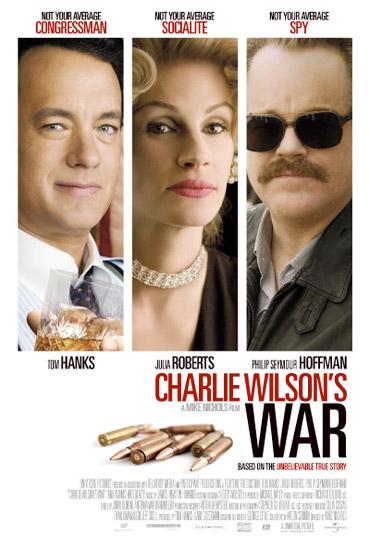
Charlie Wilson's War
The film shows Charlie having a very gregarious social life of women and partying, including having his congressional office staffed with young, attractive women. The film also shows how the partying causes a federal investigation into allegations of cocaine use by Charlie, conducted by then-federal prosecutor Rudy Giuliani as part of a larger investigation into congressional misconduct. The investigation results in no charge against Charlie.
A friend and romantic interest, Joanne Herring, encourages Charlie to do more to help the Afghans, and persuades Charlie to visit the Pakistani leadership. The Pakistanis complain about the inadequate support of the U.S. to oppose the Soviets, and they insist that Charlie visit a major Pakistan-based Afghan refugee camp. Deeply moved by their misery and determination to fight, Charlie is frustrated by the regional CIA personnel's insistence on a low key approach against the Soviet occupation of Afghanistan. Charlie returns home to lead an effort to substantially increase funding to the mujahideen.
As part of this effort, Charlie befriends the maverick CIA operative Gust Avrakotos and his understaffed Afghanistan group to find a better strategy, especially including a means to counter the Soviets' formidable Mi-24 helicopter gunship. This group was composed in part of members of the CIA's elite Special Activities Division, including a young paramilitary officer named Michael Vickers. As a result, Charlie's deft political bargaining for the necessary funding and Avrakotos' group's careful planning using those resources, such as supplying the guerrillas with FIM-92 Stinger missile launchers, turns the Soviet occupation into a deadly quagmire with their heavy fighting vehicles being destroyed at a crippling rate. The CIA's anti-communism budget evolves from $5 million to over $500 million (with the same amount matched by Saudi Arabia), startling several congressmen. This effort by Charlie ultimately evolves into a major portion of the U.S. foreign policy known as the Reagan Doctrine, under which the U.S. expanded assistance beyond just the mujahideen and began also supporting other anti-communist resistance movements around the world. Crile states that senior Pentagon official Michael Pillsbury persuaded President Ronald Reagan to provide the Stingers to the Afghans: "Ironically, neither Gust nor Charlie was directly involved in the decision and claims any credit.":419
Charlie follows Gust's guidance to seek support for post-Soviet occupation Afghanistan, but finds almost no enthusiasm in the U.S. government for even the modest measures he proposes. The film ends with Charlie receiving a major commendation for the support of the U.S. clandestine services, but his pride is tempered by his fears of what unintended consequences his secret efforts could yield in the future and the implications of U.S. disengagement from Afghanistan.










